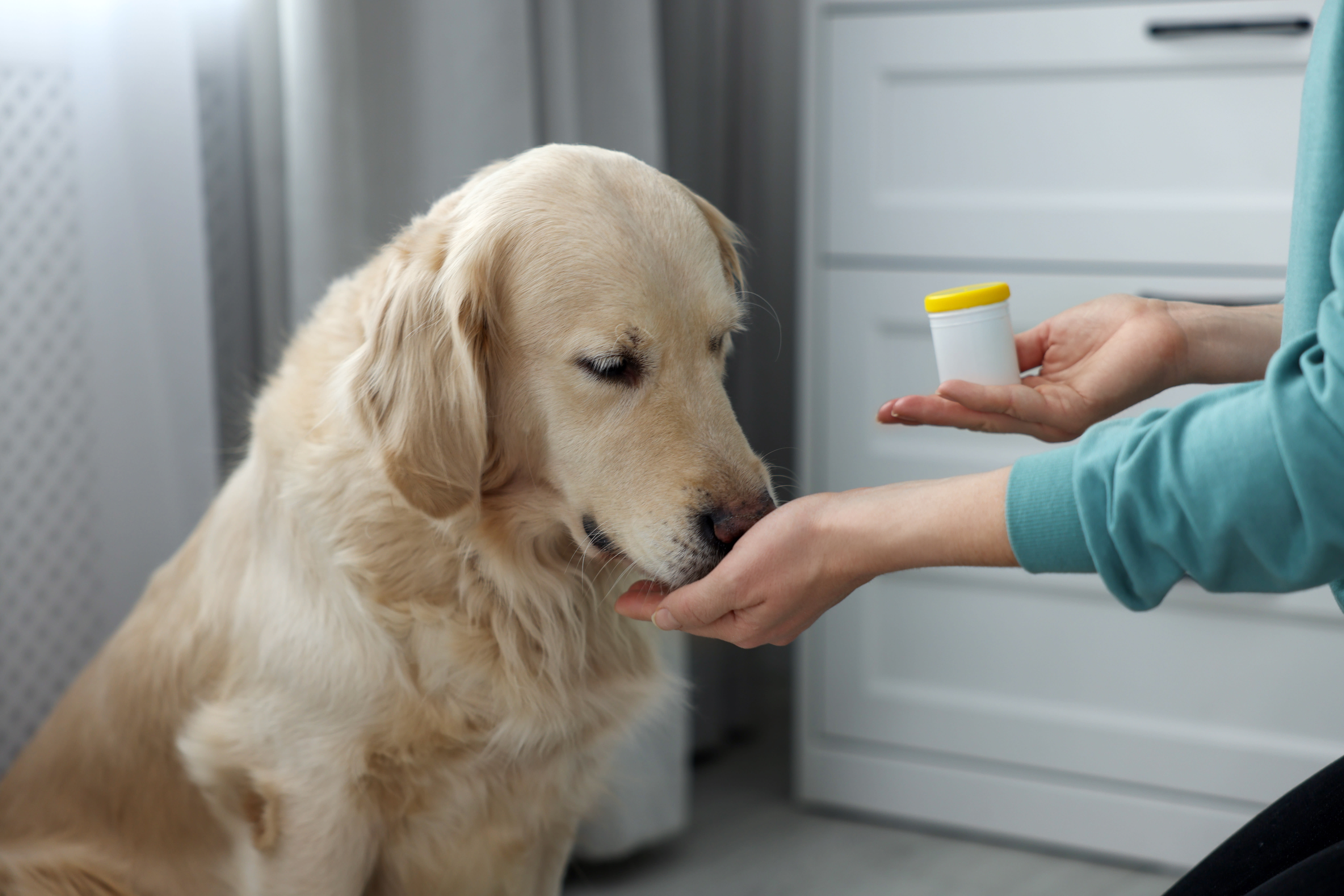Deramaxx
Related Searches
Frequently Asked Questions
Deramaxx eases the pain and discomfort associated with arthritis and other joint abnormalities to help your dog maintain his regular activity level and quality of life.
Deramaxx is labeled for use in dogs 4 lbs. or over.
-
Helps to relieve your dog's pain and inflammation caused by arthritis and other joint abnormalities
-
Also reduces pain associated with surgeries
-
May be used to treat certain bladder cancers
-
Beef flavored tablets are readily accepted by dogs
Although there is no known cure for arthritis, there is a way to help ease the pain and discomfort associated with arthritis and other joint abnormalities. Deramaxx relieves arthritis pain and inflammation to help your dog maintain his regular activity level and quality of life. Deramaxx is shown to be clinically effective and can also be used to control pain from soft-tissue and orthopedic surgeries in dogs.
Used in over a million dogs in the past two years, Deramaxx is available in beef-flavored tablets, which are easy to break apart to give the exact dose your pet needs.
Deramaxx is a non-steroidal anti-inflammatory drug (NSAID). These types of drugs inhibit the cell's production of chemicals that trigger inflammation. Various NSAIDs work differently on different dogs, so if you think your dog is suffering from the pain of arthritis, discuss the use of a NSAID, including Deramaxx, with your veterinarian.
Deramaxx is a non-steroidal anti-inflammatory drug (NSAID). These types of drugs inhibit the cell's production of chemicals that trigger inflammation. Various NSAIDs work differently on different dogs, so if you think your dog is suffering from the pain of arthritis, discuss the use of a NSAID, including Deramaxx, with your veterinarian.
Deramaxx does not cure a disease but can effectively manage symptoms of pain and inflammation. The response varies from dog to dog but can be dramatic. Pain relieving effects can generally be seen within hours of giving Deramaxx. Improvement of inflammation can generally be seen after several days. Deramaxx is not a cure for arthritis, and the signs may come back if Deramaxx is discontinued.
Deramaxx does not cure a disease but can effectively manage symptoms of pain and inflammation. The response varies from dog to dog but can be dramatic. Pain relieving effects can generally be seen within hours of giving Deramaxx. Improvement of inflammation can generally be seen after several days. Deramaxx is not a cure for arthritis, and the signs may come back if Deramaxx is discontinued.
Deracoxib
Talk to your veterinarian about what tests and exams may be necessary while your pet is taking Deramaxx. Also discuss how long the treatment period will be and what type of outcome is expected. You and your veterinarian should talk about any other treatment options that are recommended for your pet. For arthritic pets, weight loss programs, exercise programs, supplements, and other aids may be helpful.
Tell your veterinarian if your dog is experiencing any vomiting or diarrhea, has liver or kidney disease, has a bleeding disorder, may be pregnant or is nursing, or if you intend to breed your dog.
Notify your veterinarian of any other medications or supplements your dog is taking, and also if your dog has had any reactions to previous medications.
If you miss a dose, give it as soon as you remember. If it is almost time for the next dose, skip the one you missed and go back to the regular schedule. Do not give two doses at once.
Your pet will need certain laboratory tests and exams while taking Deramaxx. Give Deramaxx exactly as your veterinarian directs. Be aware of the common side effects of this medication (listed below) common side effects. Notify your veterinarian immediately if any side effects are observed.
Do NOT give Deramaxx to cats.
Not for use in cats.
Not for use in animals who are hypersensitive (allergic) to carprofen (Rimadyl, Novox), aspirin, etodolac (EtoGesic), firocoxib (Previcox), meloxicam (Metacam), tepoxalin (Zubrin), or other NSAIDs.
Not for use in dogs with less than 4 pounds of body weight, as accurate dosing cannot be made.
The most common side effect of NSAIDs is stomach upset, but stomach ulcers may develop, in which case you may see loss of appetite; vomiting; diarrhea; dark, tarry or, bloody stools; or constipation. Side effects involving the kidney include increased thirst and urination, or changes in the urine color or smell. Liver-related side effects include jaundice (yellowing of the gums, skin, or eyes). Other side effects may include pale gums, lethargy, shedding, incoordination, seizures, or behavioral changes. If any of these side effects are observed, stop treatment and contact your veterinarian.
If your pet experiences an allergic reaction to the medication, signs may include facial swelling, hives, scratching, sudden onset of diarrhea, vomiting, shock, seizures, pale gums, cold limbs, or coma. If you observe any of these signs, contact your veterinarian immediately.
Store at room temperature in a tight, light resistant, childproof container; do not expose to high heat. The chewable form of the drug is appealing to pets and children. Store in a secure area to prevent an accidental overdose.
With an overdose you may see vomiting; diarrhea; dark, tarry, or bloody stools; constipation; increased thirst and urination; changes in the urine color or smell; yellowing of the gums, skin, or eyes; incoordination; seizures; or behavioral changes. If you know or suspect your pet has had an overdose or if any of these side effects are observed, stop treatment and contact your veterinarian immediately.
Consult your veterinarian before using Deramaxx with any other medications, including vitamins and supplements, other NSAIDs (e.g., aspirin, carprofen (Rimadyl, Novox), etodolac (EtoGesic), firocoxib (Previcox), tepoxalin (Zubrin), and meloxicam (Metacam); steroids (e.g., prednisone, dexamethasone, Medrol, triamcinolone), methotrexate, furosemide (Lasix), digoxin, phenobarbital, oral anticoagulants (heparin, warfarin), enalapril, phenylpropanolamine, sulfa drugs, and some oral antidiabetic drugs, since interactions may occur.









